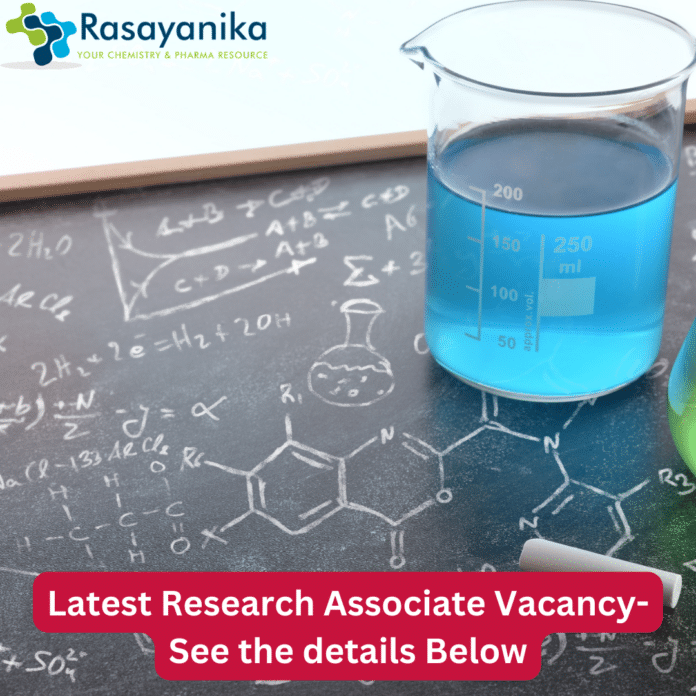UPL Limited (NSE: UPL & BSE: 512070, LSE: UPLL) is a global provider of sustainable agriculture products and solutions, with annual revenue exceeding $6bn. Flow Chemistry Sr. Research Associate opening. Latest USP careers. Latest Chemical Engineering Opening. Find the details below and apply online if interested in the Latest Chemical Engineering Opening.
Job role – Sr. Research Associate Flow Chemistry
Job Id: 7865
City: Vapi, Gujarat, India
Purpose of the Role:
This position is meant to serve the purpose of being the front line of the flow chemistry to ensure that Process Engineering and design work is done with rigor and made error-free.
Job Responsibilities:
- Process Intensification of key APIs from batch to continuous flow process.
- Conduct trial batches in the pilot plant.
- RTD Studies, Process design calculations, flow diagrams and P&IDs
- Engineering, commissioning and automation of the Flow Pilot plant
- Data generation and data collection are required for the Scale-up process.
- In-house Reactor design and fabrication
Qualification:
B.E. / B. Tech. – Chemical (Full time) with 2-5 Years of Experience
Knowledge of:
- Strong basics of flow chemistry.
- Scale-up studies, Pilot Trials
- Attention to detail & excellent presentation skills
- Basic understanding of tools like DCS, and SCADA.
Skills Required:
- Basic computer skills e.g., MS-Excel, MS-word
- Ability to work in a team with high agility
Hello everyone, We’re here to help you prepare for your upcoming interview by providing common interview questions and their answers. We hope this information will assist you in your interview preparations and lead to a successful outcome. Good luck with your interviews for the Latest Chemical Engineering Opening!
Can you explain the concept of process intensification in flow chemistry, and how it differs from traditional batch processes?
Sample Answer: Process intensification in flow chemistry involves optimizing chemical reactions to be conducted continuously in small channels or reactors, as opposed to the traditional batch-wise approach. This approach typically leads to improved efficiency, reduced waste, and enhanced control over reactions. It minimizes the use of hazardous reagents and can result in safer and more sustainable production. Flow chemistry allows for precise control of reaction parameters and offers better scalability, making it a valuable technique for the pharmaceutical industry.
What experience do you have in conducting pilot trials and RTD (Residence Time Distribution) studies for flow chemistry processes?
Sample Answer: I have had the opportunity to conduct pilot trials during my previous role as a Research Associate. These trials involved transitioning chemical processes from batch to continuous flow systems to assess feasibility and optimize parameters. Additionally, I’ve performed RTD studies to understand how reactants move through the flow reactor, helping to fine-tune reaction conditions and ensure product consistency.
Could you describe your experience with process design calculations and the creation of flow diagrams and P&IDs (Piping and Instrumentation Diagrams) for flow chemistry applications?
Sample Answer: I have substantial experience in process design calculations, where I’ve been responsible for determining key parameters such as residence time, flow rates, and temperature profiles in flow chemistry systems. I have also created detailed flow diagrams and P&IDs to visualize the entire process, including equipment, instrumentation, and control loops. These documents are essential for proper planning, troubleshooting, and process control.
How comfortable are you with engineering, commissioning, and automation of the Flow Pilot plant? Can you provide examples of projects you’ve worked on in this capacity?
Sample Answer: I am highly comfortable with engineering, commissioning, and automation aspects of a Flow Pilot plant. In my previous role, I played a pivotal role in commissioning a flow chemistry system, overseeing equipment setup, calibration, and ensuring proper integration with process control systems. I have also been involved in the development and implementation of automation strategies to improve process efficiency and safety.
Can you share your experience with in-house reactor design and fabrication for flow chemistry applications?
Sample Answer: I have hands-on experience in in-house reactor design and fabrication. During my previous role, I collaborated with the engineering team to design and construct specialized flow reactors tailored to specific processes. This involved selecting appropriate materials, ensuring proper heat transfer, and optimizing the reactor’s geometry to enhance mass and heat transfer efficiency. This experience allowed me to contribute significantly to the success of our flow chemistry projects.

















































